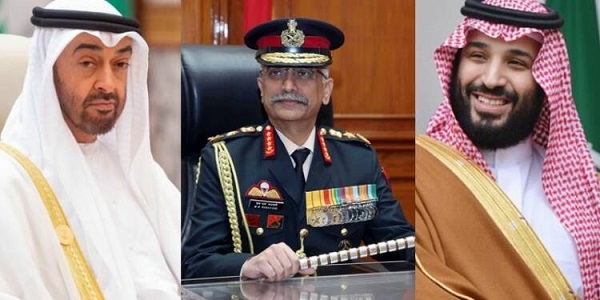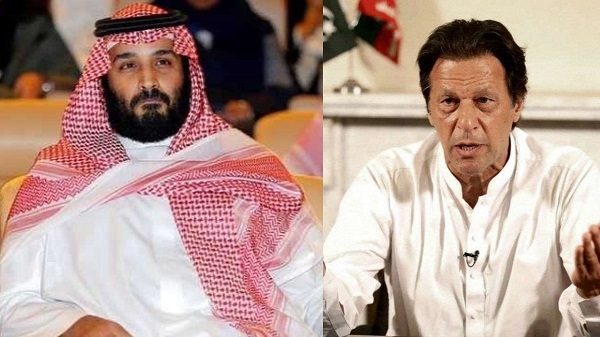The Strategic Significance of Army Chief visiting UAE, Saudi Arabia
Total Views |
- Anjali Ankad & Himali Nalawade
In a first, Indian Chief of Army Staff General Manoj Mukund Naravane is scheduled to visit Saudi Arabia and the United Arab Emirates (UAE). This visit by the Army Chief comes after External Affairs Minister Dr. S Jaishankar traveled to Bahrain and the UAE during November 24-26. This added more significance to strengthen the ties between India and these West Asian countries.

The details are not yet revealed by all the three countries, however, the diplomats and other authorities have informed about it. It is being said that he will spend two days each in both West Asian countries, that is to home to nine million Indians in the region. He will also hold meetings with the military leadership of the two countries.
India is putting in efforts to improve the ties with the Gulf countries lately especially with UAE and Saudi Arabia. In recent years, Saudi Arabia and India have been involved in the exercises and several meetings between the nations have also taken place. Both countries - UAE and Saudi Arabia - are also India's largest trading and investment partners in the region that can eventually result in boosting security cooperation with India. As mentioned above, millions of Indians residing there play an important role as they send billions of dollars back home, making it more compulsory to deepen the relationship. The Army Chief's visit would be seen in this context to enhance these ties.
The possibilities of his visit could be exploring defence productions and development. During PM Narendra Modi's visit to Saudi Arabia, an MoU was signed between the Saudi General Authority of Military Industries (GAMI) and the Department of Defence Production, Ministry of Defence concerning collaboration in the military acquisition, industries, research, development, and technology. There might be a discussion on conducting bilateral military exercises between Saudi Arabia and India.
Meanwhile, this is Army Chief's third strategic trip in the last 3 months after he visited Nepal and Myanmar earlier. In October, Army Chief accompanied foreign secretary Harsh Shringla on a visit to Myanmar, where they held talks with the senior leadership, including Aung San Suu Kyi and Senior Gen Min Aung Hlaing, on security and development cooperation.
Last month, Naravane went on a three-day visit to Kathmandu helping to improve the ties after a border row over a new political map issued by Kathmandu that included Indian territories. He met the Prime Minister of Nepal KP Sharma Oli. He also gifted medical equipment, including X-ray machines, computed radiography systems, ICU ventilators, video endoscopy units, and anesthesia machines, for two field hospitals of the Nepali Army.
“The visits also come at a time when Pakistan’s ties with both Saudi Arabia and the UAE are strained. Saudia Arabia had sharply reacted after Islamabad’s criticized Riyadh’s position on the Kashmir issue.”
Recently, it also sought the early repayment of a $3-billion loan provided to the Imran Khan government in 2018. Following this, Prime Minister Imran Khan had made an unsuccessful attempt to forge a new grouping of Islamic countries with Turkey and Malaysia – a move that further irked Riyadh.

Pakistan and Saudi Arabia have had a deep military collaboration since their agreement in 1967. Since the 1980s, thousands of Pakistani soldiers have been deployed on Saudi soil for the protection and training of Saudi forces. With former Pakistan Army chief Raheel Sharif still employed by Saudi Arabia to head the Islamic counter terrorism coalition - an alliance of 39 Muslim countries, inviting Gen Naravane sends out a strong message.
With Pakistan's undecided and confused approach in West Asia, and efforts to balance between the two Islamic thrones of Turkey and Saudi Arabia that seem to be a complete failure for now, this visit of Indian army chief followed immediately after that of S Jaishankar's, is going to possess huge diplomatic pressure on the 'Hukumat-e-Pakistan'.
Pakistan currently is in it's worst phase. The Islamic state has completely collapsed economically and is totally dependent on China. In that case, even Pakistan is aware that they cannot totally rely on China since the dragon is developing specific regions of Pakistan merely with the aim of providing leverage to China's access to the Gwadar port, that is strategically important for China. However, if one looks at the bigger picture then it is very much evident that Pakistan too has been debt trapped by China. Islamabad has failed in sustaining their diplomatic relations with the world.
“On the other hand, Saudi Arabia is looking at India as a potential partner in global politics. The military ties between the two nations are in line to strengthen the comprehensive aspects of India-Saudi Arabia bilateral relations.”
The political turmoil in Pakistan caused by opposition's Pakistan Democratic Moement (PDM), has put Islamabad in a grievous situation. The failed diplomatic approach of the Imran Khan government has made both Turkey and Saudi Arabia doubtful about the credibility of the state to maintain healthy foreign relations in future. That is why, the future of Pakistan with either of the two states is uncertain.

